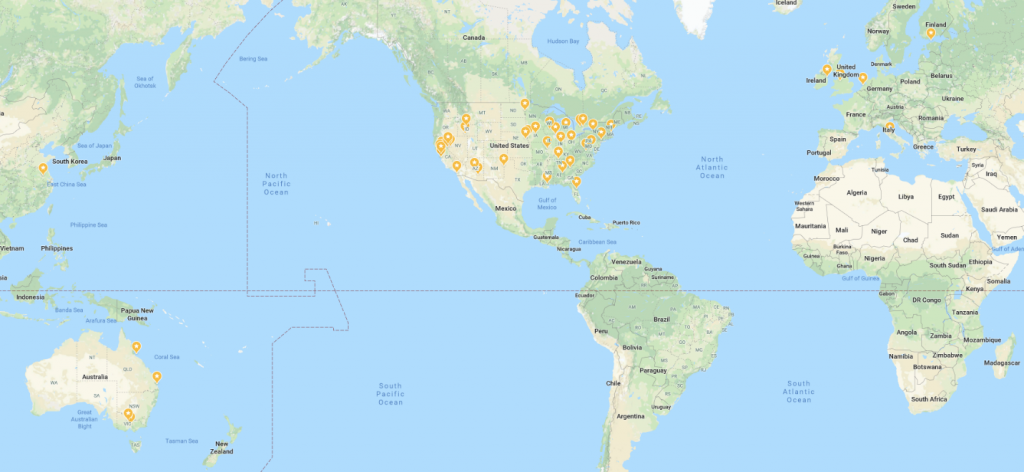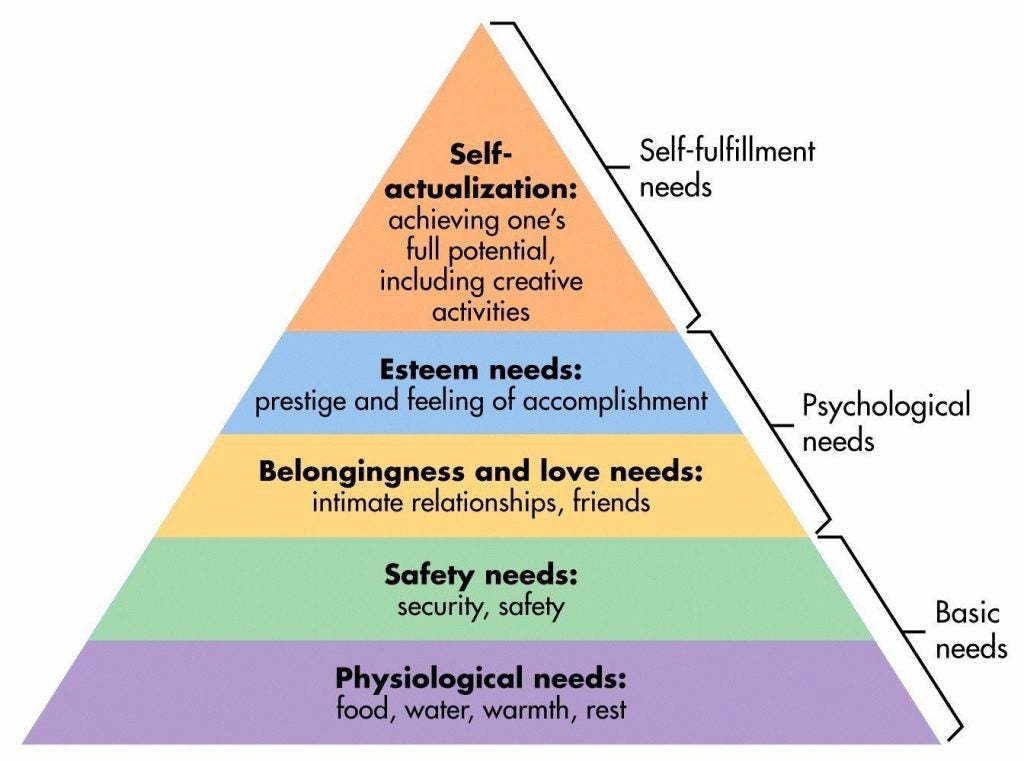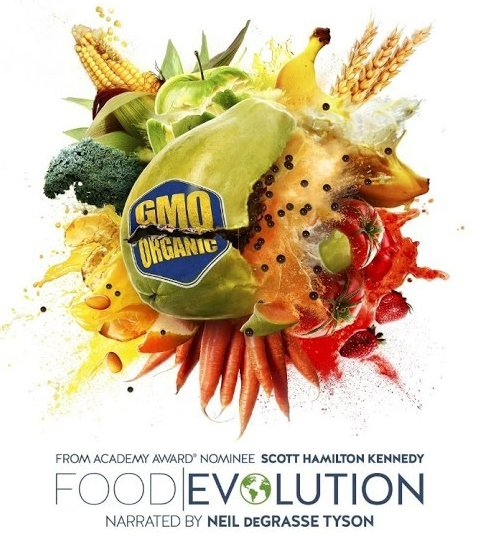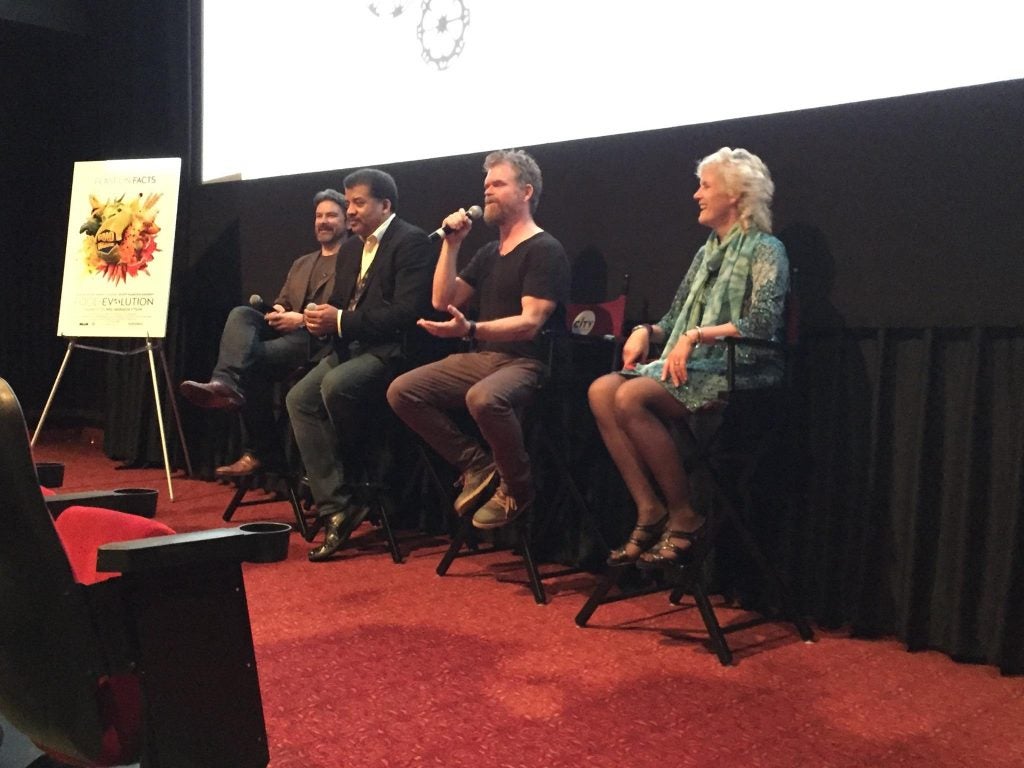My first BLOG for 2017, and in fact all 9 of this year’s BLOGs, were triggered by either bad science or blatant misinformation about agriculture. Typically the only way a topic raises to the level of justifying me writing a BLOG is that the balance of my annoyance at the erroneous material that is being put out there outweighs everything other thing that needs to be accomplished that day, and so it tends to be I blog more in the early half of the year than in the later part of the year when reading theses, and chapter deadlines loom heavy at the end of year approaches.
This has been a busy #scicomm year for me and despite my best intentions to be a frequent blogger, I have not been able to keep up with that in addition to my “day” job which also tends to be an evening and sometimes night job as well. This map gives you some idea of my speaking schedule in 2017 – some 46 cities, 23 US states, and 9 countries. Typically I speak at producer or allied industry meetings, or scientific conferences. Sometimes I even get to tour the farms in conjunction with speaking engagements which helps me keep current with farmers and the issues they are facing in different areas. In that regard I think extension educators are a unique segment of academia. Fly geneticists who study the nervous system probably don’t get out into the applied end of neuroscience in clinics in the same way as often.

Most people do not know the realities of the job of a Cooperative Extension specialist, we translate public land-grant university research into application. It is our job to get out and talk to people applying science in farming and in the food production industry and to hear about the problems they need help solving. Extension has literally be doing #scicomm “for the average person” since the Smith-Lever Act was signed into law in 1914. Historically audiences have been farmers, as the US was a nation of farmers.
Today, less than two percent of the population engages in farming. There is now an urgent need to translate the intricacies and science of farming to the “average person”, because there is no use translating technology to a farming audience, if the general public is just going to turn around and reject the use of that technology in their food production systems based on misinformation they obtained on the internet or social media! This to me is the #scicomm challenge of the 21st century – how to counter the whack-a-mole of alternative facts as it relates to food and agriculture production systems. Extension needs to extend further now.
There are too few people with expertise in agricultural science addressing the discussions around “food systems”. It seems like everyone gets asked their opinion by the media, or to serve on panels about agriculture and food production – chefs, actors, book writers, celebrity bloggers, journalists, mommies, activists – everyone except farmers and agricultural scientists.
Just for fun I googled “what percentage of the population are agricultural and food scientists?” According to the Bureau of Labor and Statistics there were only 43,000 of us in 2016! That is 0.013% of the US population working as “Agricultural and food scientists research ways to improve the efficiency and safety of agricultural establishments and products”! We are literally like hen’s teeth. There are actually more Yoga instructors registered in the US. By way of comparison in 2016 there were 1,028,700 “Farmers, Ranchers, and Other Agricultural Managers” That is about 24 researchers for every farmer. That is a relatively small number of agricultural practitioners and researchers compared to the US population of 323 million people.
I sometimes think that because there is such a small proportion of the population involved in fulfilling the most fundamental lower order needs of Maslow’s hierarchy of human needs, having those basic needs met becomes assumed in the developed world, somehow devaluing the professions that enable that privilege.

Maslov’s hierachy of needs – image from https://www.simplypsychology.org/maslow.html
But I digress, back to #scicomm. I realize everyone is busy, yoga teachers, farmers and agricultural scientists alike. But those with agricultural experience and expertise have to become involved in discussions around food and agriculture, or the future of agriculture will be decided devoid of objective-information and more importantly without a nuanced understanding of the various pros, cons and tradeoffs associated with any production system. We need to become very proactive in telling the stories of farming and food production.
As Dwight D. Eisenhower famously quipped, “Farming looks mighty easy when your plow is a pencil and you’re a thousand miles from the corn field.” More and more I am making time to be involved in these public discussions, so I apologize in advance to my 2018 manuscripts, graduate students, grant reports and of course committee meeting obligations (I am a faculty member after all), but this agricultural #scicomm challenge is too important to ignore.
 Perhaps the most unique #scicomm experience I was involved with in 2017, was Food Evolution, a documentary by director Scott Hamilton-Kennedy, producer Trace Sheehan, and narrated by Neil deGrasse Tyson. In his words
Perhaps the most unique #scicomm experience I was involved with in 2017, was Food Evolution, a documentary by director Scott Hamilton-Kennedy, producer Trace Sheehan, and narrated by Neil deGrasse Tyson. In his words
“….the film explores all the ways science has been used and abused in public discourse surrounding the genetic engineering of food. In a world of misinformation and disinformation, nothing could be more timely.” Neil deGrasse Tyson
Agricultural scientists are not often involved in documentary movies. That is probably an understatement. They are almost never involved in documentary movies might be closer to the truth. Entertainment does not really align well with the patience and dispassion required by science, most days in the laboratory are not exactly riveting watching, nor are most scientists.
What was amazing for me, working with these film makers over a three or so year period, was watching how their product came together. Not in the logical, chronological, methodical, boring way that I would have crafted a movie, but in a narrative, storytelling, emotional, entertaining way that was miraculous to behold. Like making cinematic sausages. But more interesting were the parallels between science and movie making. Both are creative processes, borne out of passion, but with a completely different set of constraints and objectives.
| Science | Movie making |
| Science requires a creative mind harnessed by the rigors of the scientific method and data | Movie making requires emotion, creative story telling, and an appreciation of visual impacts |
| You start with an idea and a hypothesis you want to test, then develop a well-designed experiment to produce data that either supports or disproves it | You start with an idea of the story you want to cover and make use of good journalism to uncover the truth about that topic, driven by facts not ideology |
| Your favorite hypothesis gets disproven by data that turned out differently to what you predicted | The story you thought you were going to tell was very different from the story you ended up telling |
| A lot of experiments don’t yield useful data, and exceptions sometimes lead to new discovery | A lot of raw footage never makes the film and sometimes the story reveals itself during filming |
| A lot of experiments are tedious and require extraordinary attention to minutia and detail | A lot of movie editing is tedious and requires extraordinary attention to minutia and detail |
| You never know if or where your publication will be accepted, or the exact publication date | You never know if or where your movie will be shown, screened, or the exact release date |
| You hope your colleagues value your work | You hope the entire world watches your movie |
This film was a proactive and narrative way to tell the side of the story that has not been well described so far– about how scientists saved the cherished papaya industry in Hawaii, and how Ugandan scientists are trying now to save a culturally important food crop they call matoke. Watching audience reaction to Food Evolution has been the #scicomm highlight of my year. I have gone to screenings around the US and in a couple of other countries, including at the Food and Agriculture Organization in Rome.

Trace Sheehan, Neil DeGrasse Tyson, Scott Hamilton Kennedy and I doing Q and A panel following screening of Food Evolution in New York City
In addition, the film has been screened in many cities around the world with local discussion panels to help address the issues. The discussions following the movie have been encouraging. Rather than repeating tired old fallacies, many of which were debunked in the movie, questions were elevated to more nuanced conversations about agriculture or science communication. The best screenings for me were those at film festivals with an urban audience, totally naïve to the fractious GMO debate. These are the target audience, the silent majority that it is hard to reach with agricultural #scicomm, and the response was so positive.
Apparently critics liked the movie too as it has an impressive 100% rating on Rotten Tomatoes. It has really been a privilege and an honor to be associated with the movie, and I got to meet Neil deGrasse Tyson too! I encourage anyone that has not seen it to check it out on Hulu, or rent it on itunes, Amazon, or YouTube. And hats off to the Institute for Food Technologists (IFT) for funding to take food and agricultural science to the movies! We need more of this – Hollywood does not have a great relationship with agricultural facts. And there are a number of terrible food documentaries that are not helping the public discourse. Reacting to them is tedious, but important given the powerful influence of film.
OK that is it for 2017. I have actually been working on a series of BLOGS over this holiday break ‘cause that what #scicommers do during quarter breaks, and so to start the New Year right I am going to try to publish one BLOG a day for the next week on topics that have been sticking in my craw, some bad science, some bad policy, and some bad cinema before the quarter gets rolling. To start the series – I am coming for you Okja – tomorrow.
